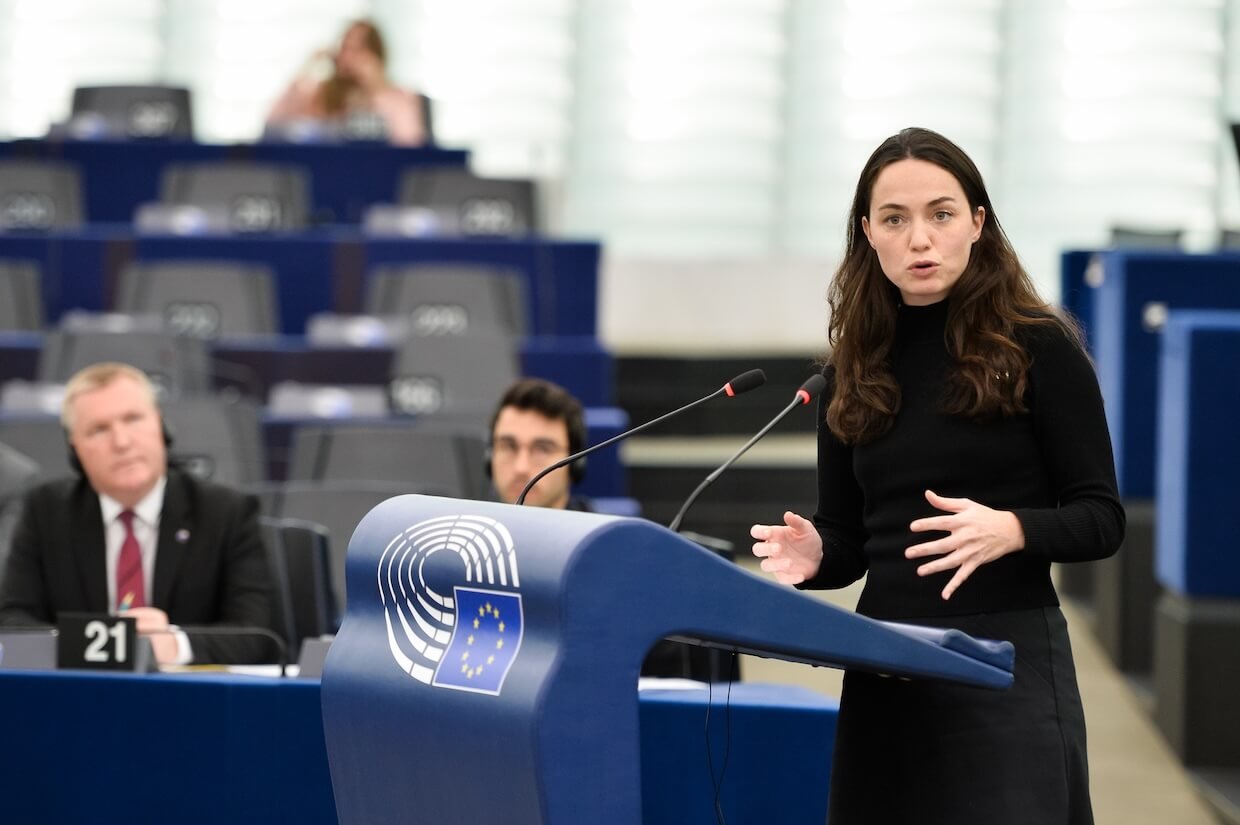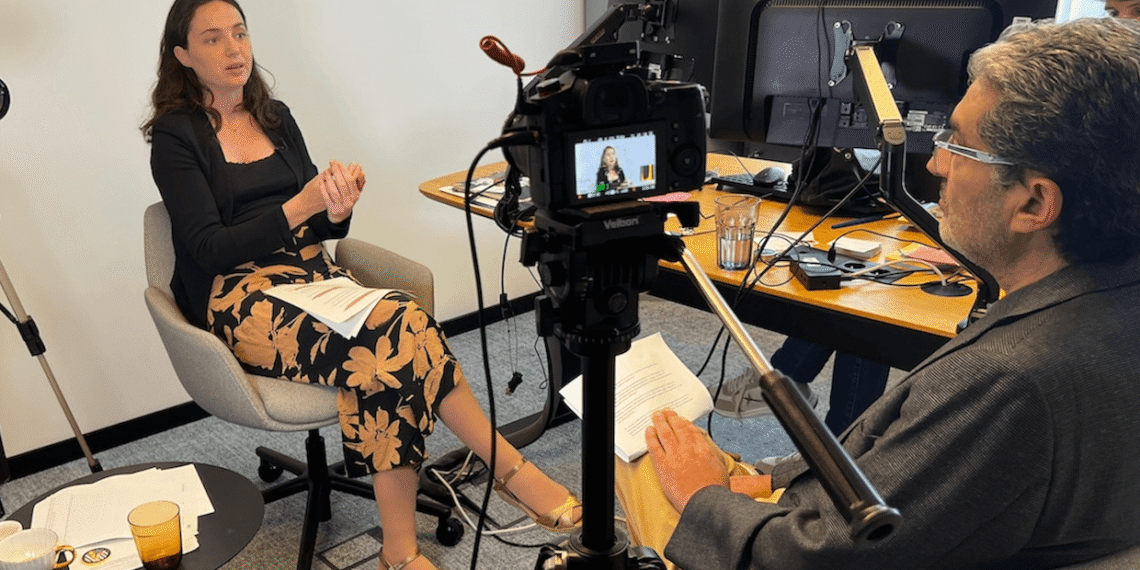In an exclusive interview with ECPS, MEP Chloé Ridel, rapporteur for the European Parliament’s forthcoming report on transnational repression, underscores the urgent need for the EU to confront transnational repression—state-organized efforts by authoritarian regimes such as Russia, China, Turkey, and Iran to silence critics abroad. Ridel calls for expanding the EU’s Global Human Rights Sanctions Regime to explicitly include transnational repression and highlights the procedural challenge posed by unanimity voting: “The only people we manage to sanction are mostly Russian… we will have difficulties applying the values we believe in.” She stresses that this is a human rights, security, and democratic issue requiring coordination, oversight of enablers, and stronger protection for vulnerable groups.
Interview by Selcuk Gultasli
In a context of intensifying authoritarian encroachment beyond national borders, transnational repression has emerged as a growing threat to Europe’s democratic integrity, sovereignty, and human rights commitments. Authoritarian regimes—including Russia, China, Turkey, and Iran—have refined techniques of intimidation and control targeting exiles, dissidents, and diaspora communities residing in democratic states, employing legal tools such as Interpol Red Notices, coercion-by-proxy against relatives, and increasingly sophisticated forms of digital harassment. In her capacity as rapporteur for the European Parliament’s forthcoming report on transnational repression, MEP Chloé Ridel of the Socialists and Democrats Group has foregrounded the urgency of a robust, coordinated European response.
In this interview with the European Center for Populism Studies (ECPS), MEP Ridel makes a compelling case for expanding the EU’s Global Human Rights Sanctions Regime to address transnational repression explicitly. She explains that “there is already an EU sanctions regime that exists, and we want this regime to also apply to states that commit transnational repression.” MEP Ridel’s recommendation is clear: the EU must recognize transnational repression as a distinct pattern of authoritarian interference, codify it in sanctions policy, and ensure it can be enforced consistently across Member States.
MEP Ridel is also critical of the procedural obstacles that blunt the effectiveness of EU sanctions, pointing to the unanimity requirement that has resulted in skewed enforcement patterns: “The only people we manage to sanction are mostly Russian; 70% of those sanctioned under the EU sanctions regime are from Russia.” Without reforms enabling qualified majority voting for sanctions decisions, she warns, “we will have difficulties applying the values we believe in on human rights.”
This approach, MEP Ridel emphasizes, is inseparable from broader efforts to coordinate intelligence, protect vulnerable groups such as women, human rights defenders, and hold enablers—particularly social media platforms—accountable. “States rely on enablers such as social media platforms and spyware businesses, and these enablers must also be held accountable,” she argues. In advocating for expert focal points on transnational repression in both EU delegations and national administrations, Ridel calls for the EU to develop institutional expertise to “help victims of transnational repression” who often “don’t even know they are victims” until attacked.
This interview provides an incisive analysis of the tools and frameworks required to confront transnational repression effectively. EP rapporteur Ridel’s proposals offer a principled roadmap for embedding human rights and democratic sovereignty at the heart of EU foreign and security policy.

Here is the transcript of our interview with MEP Chloé Ridel, edited lightly for readability.
Transnational Repression Must Be Defined Properly
Chloé Ridel, thank you very much for joining our interview series. First of all, can you please tell us about the fate of the report? You submitted it to the subcommittee on human rights. What will happen next?
MEP Chloé Ridel: I submitted my draft report in June to the Committee on Human Rights, which is a subcommittee of the Foreign Affairs Committee here in the European Parliament. Time was then allowed for other political groups to table amendments, which will be discussed throughout September. We will have a vote in the Foreign Affairs Committee in October, followed by the final vote in the plenary session of the European Parliament at the end of November.
Your draft report acknowledges the lack of a universally accepted definition of transnational repression. How should the EU conceptualize this phenomenon in legal and policy terms, especially considering the practices of regimes like Turkey, Iran, China, and Russia, to ensure both legal precision and operational flexibility?
MEP Chloé Ridel: Yes, you’re absolutely right. There is no definition of transnational repression in EU law or international law. Recently, the UN adopted a definition for transnational repression because it’s a growing phenomenon, as I tried to describe in my report. So, I suggest an EU definition for transnational repression because if we don’t know what it is, we cannot fight it properly. We define transnational repression as “state-organized actions that cross borders to coerce, control, or silence individuals through physical, legal, or digital means.”
This is a growing and quite concentrated phenomenon: 80% of all transnational repression actions are committed by just 10 states. Among these states are China, Turkey, Iran, Tajikistan, Uzbekistan, Belarus, and Russia. It is committed by authoritarian regimes that seek to silence members of their diaspora, political opponents, or journalists. For the EU, it’s a significant challenge because it constitutes foreign interference, is a security matter, and targets human rights defenders whom we have an interest in protecting — and we are not doing enough to protect them.
Transnational Repression Is a Security Issue, a Human Rights Issue, and a Democratic Issue
Given that transnational repression by authoritarian and repressive regimes blurs the lines between external authoritarian influence and internal security threats, should the EU frame this challenge primarily as a human rights issue, a security concern, or a hybrid phenomenon demanding an integrated policy response?
MEP Chloé Ridel: I think this is all of it at once. It is a human rights issue, of course, because it targets human rights defenders, and I will return to that. It is also a security and sovereignty issue because we cannot accept that foreign authoritarian regimes come to our streets to threaten people who are legal residents and under our protection. It becomes a threat to us as well. Unfortunately, transnational repression continues to occur in Europe. It includes physical threats, poisoning, and digital surveillance. Take the example of the Russian diaspora: after the invasion of Ukraine in 2022, more than 90 Russian journalist agencies came to Europe to continue their work freely. It is in our interest to protect these journalists because they are the last free Russian journalists in the world, and they still speak to the Russian people. We know that Putin expands his power by controlling people’s minds, and if we want to fight this kind of war with Putin, we need free journalism that can still speak to the Russian people back home. So yes, it is a security issue, a human rights issue, and also a democratic issue.
EU’s Digital Services Act Must Hold Platforms Accountable
Authoritarian regimes including China, Russia, Turkey and Iran have weaponized digital platforms to target exiles. How can the EU ensure that the Digital Services Act is effectively enforced to mitigate these risks, particularly protecting vulnerable groups like women human rights defenders from online harassment orchestrated by authoritarian actors?
MEP Chloé Ridel: As you pointed out very well, digital transnational repression is growing and authoritarian regimes use social media to harass opponents, often targeting women, sometimes through the circulation of sexualized content. This is a specific and growing form of violence, and social media platforms are enabling it. They are not doing enough to prevent transnational repression online, and they should. By companies, I mean the platforms themselves, because they now constitute major public spaces where public debate happens.
We need rules because we cannot have such impactful public spaces controlled by private companies without oversight. In Europe, we voted for a strong legislative framework, the Digital Services Act (DSA), but we are still waiting for it to be effectively enforced. For example, an investigation was opened against X (formerly Twitter) two years ago, but there are still no conclusions or sanctions, despite clear violations of the DSA—there is no content moderation, widespread disinformation, and manipulation of algorithms to boost certain types of content. We need effective enforcement of the DSA to hold these big companies accountable. While transnational repression is state-organized, states rely on enablers, such as social media platforms and spyware businesses, and these enablers must also be held accountable for that repression.
Iran, Egypt, Turkey and Tajikistan are notorious for coercion-by-proxy, targeting relatives of exiles to silence dissent abroad. What practical measures can the EU adopt to recognize, document, and respond to this diffuse and intimate form of repression?
MEP Chloé Ridel: You are right, transnational repression can occur when authoritarian regimes target family members who remain in the home country while someone goes abroad to seek exile or refuge. And it’s very difficult. Currently, the EU does not protect family members who may be threatened by authoritarian regimes simply because they are related to a prominent human rights defender or similar figure. So, I think we should enable the EU program called ProtectDefenders.eu to also protect family members of a defender, not just the defender themselves, because we know that authoritarian regimes use threats against family to repress human rights defenders.
A Coordinated EU Response Needed to Stop Abuse of Red Notices
Given that Turkey, Russia, and China systematically abuse Interpol Red Notices and extradition treaties to pursue political exiles, what reforms should the EU promote within its judicial cooperation frameworks and at Interpol to prevent instrumentalization while safeguarding legitimate law enforcement cooperation?
MEP Chloé Ridel: The abuse of Interpol Red Notices is a very important matter for me, and it’s a key part of my report because, as you mentioned, even though Interpol is aware of abuses, the problem persists. Authoritarian regimes continue to send or request Red Notices against human rights defenders, even though these notices are supposedly intended to target terrorists or very serious criminals. For example, there are currently more than 200 Red Notices from Tajikistan targeting human rights defenders living in the EU. So, we need to raise awareness among member states not to arrest or execute these notices and to develop a coordinated EU response on this issue.
In my report, I suggest that transnational repression be included in Europol’s mandate, so that Europol can assess the relevance of Red Notices when they target human rights defenders and provide assessments to member states, exerting pressure on national governments not to execute abusive Red Notices.
For example, there was the case of an Iranian activist in Italy in 2017 who was arrested based on a Red Notice from Iran and later freed. There was also the case of Paul Watson, an environmental activist defending whales, who was targeted by a Red Notice from Japan. He could live freely in France and Germany but was ultimately arrested by Denmark based on this Red Notice. What kind of coordination is this? He was eventually freed, but only after months in jail, and clearly the Red Notice against him was abusive.
We need to stop this abuse, and one way to do so is to involve the EU—not by giving the EU the power to execute Red Notices, which remains a national competence—but by enabling it to assess and declare when a Red Notice is abusive and should not be executed.
“We Must Coordinate at EU Level to Tackle Transnational Repression”

How can the EU promote harmonization of national legal frameworks to ensure that no Member State becomes a permissive jurisdiction or “safe haven” for authoritarian actors from regimes such as Belarus or Egypt, while respecting national sovereignty and legal diversity?
MEP Chloé Ridel: We need more coordination at the EU level to tackle transnational repression. Transnational repression should be more widely discussed among ministers of internal affairs, security, foreign affairs, and heads of state as well. It was discussed recently at the G7 forum, and it is a matter for all democracies because we can see a kind of authoritarian internationalism building itself, notably through transnational repression, where authoritarian regimes help each other control, coerce, and silence their political opposition. We have an interest in protecting this political opposition because they are sometimes the last free voices of civil society in some countries.
We need to do more to coordinate at the European level and to raise awareness at the European level. Sometimes I have noticed during my work on this report that security services have difficulty assessing and recognizing transnational repression. So, I suggested in my report having an expert on transnational repression in each security administration in each member state—a contact point or something like that. For instance, this exists in Canada, Australia, and the US, where they have teams specifically responsible for transnational repression involving many different ministries. It is important that we build expertise within each nation on transnational repression and that all of this be coordinated at the European level.
Oppressive states like Turkey and China often use religious, cultural, and educational institutions abroad as instruments of covert surveillance and influence. How should EU policy distinguish and regulate these activities to protect democratic norms without stigmatizing legitimate diaspora engagement?
MEP Chloé Ridel: Sure. I think this is indeed a problem, and we need to control funds that go to religious institutions, for instance. We cannot allow authoritarian or adverse regimes to fund NGOs or religious institutions on European soil without oversight of how those funds are used. This is something we must address because it’s a growing and concerning phenomenon.
Prevent Discrimination and Promote Integration to Counter Radicalization
Given that authoritarian regimes actively manipulate divisions within diasporas—for example, Turkey’s polarization of Turkish communities in Europe—how should EU integration and anti-radicalization strategies respond to these fractures to avoid inadvertently amplifying authoritarian influence?
MEP Chloé Ridel: This is another topic—it’s not transnational repression per se, but rather manipulation of diasporas to harm a country or create conflict. We can see it in my country, France, where there is a Turkish association called the Grey Wolves, a very dangerous group that was ultimately banned and dissolved. It’s an example because there were violent demonstrations by members of this group, and they exerted a kind of control over the Turkish diaspora in France, dictating how they should behave, which also prevented good integration into French society for Turkish immigrants.
We need to fight back and have state solutions against such extremist associations. We must also ensure that public services and integration services—through work, language learning, and civic values—are available so that we can prevent radicalization. Radicalization happens when there is discrimination; extremists target marginalized people and say, “France is discriminating against you, it doesn’t want you here, so you should abide by this ideology instead.” To prevent that, we must prevent discrimination and ensure that these individuals feel part of the national community in Europe. It’s a matter of integration to fight radicalization, and also a security matter: to be able to identify and prohibit such associations and groups when they form, if they are dangerous.
Coordinated EU Action Key to Protecting Rights Defenders
Your report recommends focal points on human rights defenders within EU delegations. What skills, mandates, and resources will these officers need to respond effectively to transnational repression, particularly from aggressive regimes like Russia and China, in high-risk environments?
MEP Chloé Ridel: It’s important that we have contact points in every EU delegation throughout the world that can gather information on how authoritarian regimes exert transnational repression. Coordination is key to fighting this growing phenomenon. We need contact points both in EU delegations and in each national administration, and through the exchange of information we can tackle it. We are stronger together in Europe; if we gather information and experts across different countries and Europe plays a coordinating role, we can collect valuable intelligence and help victims of transnational repression. Sometimes they don’t even know they are victims—there are people being followed or surveilled until the day they are attacked; people who have spyware on their phones and don’t know it because they are not trained in cybersecurity.
In my report, I want to incentivize and raise awareness about spyware, to emphasize that, first, the EU should ban the export of spyware technologies produced in Europe to authoritarian regimes, because we know this will be used against us and against human rights defenders on our soil. We should also, when we know that a human rights defender is at risk of transnational repression, say: come to our office, we will explain a few security rules to you as a matter of prevention so you can regularly check your phones or computers to ensure there is no spyware, because nowadays it’s very easy to hide spyware on a phone or computer.
And lastly, do you see a role for the EU in spearheading an international legal instrument specifically addressing transnational repression, modeled on Magnitsky-style sanctions, to confront regimes such as Belarus, Saudi Arabia, China and Turkey? How might this enhance global accountability and norm-setting?
Chloé Ridel: Actually, there is already an EU sanctions regime that exists and we want this regime to also apply to states that commit transnational repression. So, I call in my report to enlarge the EU sanctions regime so that it effectively targets transnational repression. There is also a longstanding demand from our group, the Socialists and Democrats group, that EU sanctions be decided by qualified majority and not unanimity, because with unanimity, often you go nowhere. The only people we manage to sanction are mostly Russian; 70% of those sanctioned under the EU sanctions regime are from Russia. I’m sure many more countries I’ve described to you could be sanctioned in the name of human rights and under the EU sanctions regime. So, if we don’t move toward qualified majority, we will have difficulties applying the values we believe in on human rights.


